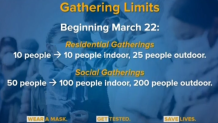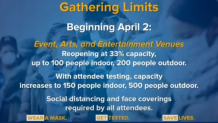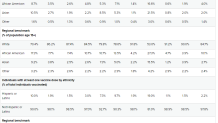What to Know
- The slower-than-desired national vaccine rollout got a major boost this week; the first Johnson & Johnson doses were shipped and Merck has signed on to help its rival manufacture more faster
- Gov. Cuomo says domestic travelers to NY no longer have to quarantine or test-out 90 days post-full vaccination; event spaces can reopen at 33% capacity as of April 2
- In NJ, Gov. Murphy said Wednesday wedding receptions can resume at 35% of a venue's indoor capacity up to 150 people (up to 150 outside); sleepaway camps can also resume operations this summer
Gov. Andrew Cuomo reestablished his COVID briefing routine Wednesday after a nearly two-week hiatus from on-camera newsers with Q&As. It came a day after state legislators reached a deal to strip him of pandemic emergency powers.
Cuomo acknowledged that deal but didn't immediately address the matter further. Instead, he announced domestic travelers would no longer be required to quarantine or test-out within 90 days of full vaccination. International travelers must continue to follow CDC quarantine guidance.
On the reopening front, the governor said New York would raise residential gathering limits from 10 people in any space to 25 people outdoors on March 22 (the indoor limit remains). Social gathering limits can climb to 100 people indoors and 200 outdoors, up from the 50-person limit currently in place.
Get Tri-state area news and weather forecasts to your inbox. Sign up for NBC New York newsletters.

Event, arts and entertainment venues with less than 10,000-person capacity can reopen at 33 percent capacity (maximum 100 people indoors, 200 outdoors) early next month, on April 2, Cuomo added. That capacity cap increases if COVID testing is required -- to 150 people indoors and 500 people outdoors.
Those under 10,000-people venues were not part of the "large venue" limited public opening Cuomo approved last month. He is now piloting a COVID passport of sorts to fast-track large-scale reopenings and that could have larger applications fairly soon. In announcing the latest news Wednesday, the governor again cited sustained declines in the state's COVID rates as fuel for his decisions.
While Wednesday's announcement was said to apply to smaller venues — like clubs, live music and comedy — most Broadway theaters will still remain shut down. But there was good news: Select smaller Broadway theaters, such as the Music Box on 45th Street, will be able to open in April after being closed for nearly 13 months, which could allow some plays and concerts to resume.

The state's Department of Health is set to work with PopsUp, a festival of pop-up events, and theater operators to create safety plans for participating buildings. That process will serve as a pilot program to reopen "flexible venues," or Flex Venues, such as the Apollo, Park Avenue Armory, St. Ann's Warehouse, The SHED, Harlem Stage, National Black Theater and more. From there, the safety protocols will eventually be employed for Broadway to return at some point, as the program will slowly increase audience size over time as the Health Department allows.
"We are delighted that fans will once again be able to experience live performance events through PopsUp," The Broadway League said in a statement. "While Broadway productions are not able to return just yet, we're glad that arts venues, including select Broadway theater, will be able to open their doors and give the public a taste of what we've all been missing so much through these dark times."
Boosted vaccine supply has also fortified the reopening effort, as well as the vaccination rollout itself. New Yorkers experienced major frustration booking their COVID-19 vaccine appointments (if they were even able to book one) just a few weeks ago.
Wait times at state-run sites stretched well past mid-April. People were traveling hours out of state and across the state in hopes of getting on a line somewhere.
The circumstances have changed a bit. Thousands of new appointments opened for registration starting Wednesday, thanks to a supply fortified by the latest federally emergency-use approved single-dose Johnson & Johnson vaccine.
Those appointments are expected to open up slots at the jointly run state/city Bronx residents-only mass vaccination site at Yankee Stadium, where hours will be expanded to 24 hours a day, seven days a week. Starting Thursday, the Javits Center hub in Manhattan will have more overnight appointments available.
New appointments for the Yankee Stadium site went live at 11 a.m. Wednesday (eligible Bronx residents should check here); new Javits Center bookings open up at 8 a.m. Thursday. Visit New York's 'Am I Eligible' website or call the state's COVID-19 Vaccination Hotline at 1-833-NYS-4-VAX (1-833-697-4829) for details.
Not sure how the process works? Check out our handy tri-state vaccine site finder and FAQs here
New York City and New Jersey Vaccine Providers
Click on each provider to find more information on scheduling appointments for the COVID-19 Vaccine.
Data: City of New York, State of New Jersey • Nina Lin / NBC
Appointments will certainly fill up quickly again because there the state is getting about 165,000 doses of the Johnson & Johnson vaccine, about 70,000 of which are allocated to the city. The next J&J shipment comes in about 10 days.
Mayor Bill de Blasio said he expects the Johnson & Johnson doses and overall vaccine supply to increase significantly by the end of March. The newest vaccine is easier to store and only requires one shot, which will make it easier to get doses in arms and move down along the line of New Yorkers waiting.
De Blasio and his health team say they'll use the initial Johnson & Johnson doses to prioritize homebound seniors. The J&J doses allocated for Yankee Stadium and the Javits Center will start going in arms overnight Thursday and Friday, respectively.
Tracking Coronavirus in Tri-State
There are some lingering headaches. Those who can grab appointments may still have to wait hours in socially distanced lines. One man who didn't want to be identified by name said he showed up for his 5:30 p.m. appointment Tuesday at the Javits Center but didn't receive a shot until 8:40 p.m.
"I waited almost 45 mins outside but once inside the atrium I waited another 45 mins which lead us to another room where almost a thousand people were on line to register," he said. "Once registered there’s another line where we waited for another 30 mins. The whole vaccine took 4 hours and 30 mins. It’s ridiculous."
On Wednesday, the process was much smoother at the Javits Center, with reported wait times no more than an hour.
As of Wednesday, New York City had about 154,000 first doses on hand, an increase of more than 125,000 overnight as its latest infusion arrived. The city has administered more than 2 million total doses, including at least one first dose to 1.2 million people, about 13.9 percent of its population. Less than 7 percent of New York City's population has been fully vaccinated, the latest state data shows.
With Cuomo poised to lose his emergency power to unilaterally set statewide policy during the pandemic as early as Friday, de Blasio is once again criticizing the governor's tight grip on COVID-19 policies and demanded, as he has many a time over the last month and a half, more freedom to vaccinate.
"If you put too much power in one person's hands, bad things happen," de Blasio said Tuesday. "In a normal government where there would be respect for the health professionals and they would have the freedom to do their work, we'd be having a different discussion," he added. "Give us the ability to make our own decisions. And local control, just restoring normal governance would do that."
The city hit a new single-day record Friday at more than 76,000 shots. It hopes to scale up even more with the infusion from Johnson & Johnson adding to supply from other manufacturers. The city has the distribution capacity to inoculate a half-million a week, de Blasio has said. Last week, it got the closest to that half-million weekly mark it has so far, with 338,000-plus shots done, the mayor said.
Statewide, about 15.6 percent of the population has had at least one dose, while more than 8 percent of New Yorkers have completed their vaccination series. The state said that more than 121,000 first and second doses had been administered over the previous 24 hours. There are approximately 10 million New Yorkers currently eligible for the vaccine.
Three more FEMA-run vaccine sites open Wednesday in Yonkers, Buffalo, Rochester and Albany, each with the capacity to inoculate 1,000 people a day. Appointments the first week are reserved for New Yorkers in areas with low vaccination rates. Then they open up to eligible people in the respective counties.
Daily Percentage of Positive Tests by New York Region
Gov. Andrew Cuomo breaks the state into 10 regions for testing purposes and tracks positivity rates to identify potential hotspots. Here's the latest tracking data by region and for the five boroughs. For the latest county-level results statewide, click here
Source: ny.gov
Despite the deluge of vaccination sites planned and those already available, stark racial/ethnic and socioeconomic disparities persist. White people have been disproportionately represented in vaccination rates compared with their share of the eligible population across this state and others.
New demographic data released by the state Tuesday shows those racial disparities continue to exist across all of the state's 10 regions, most notably in the Finger Lakes and Mid-Hudson areas, where white people account for 92.3 percent and 86.6 percent, respectively, of all those who have received at least one dose. By comparison, whites are 84.5 percent and 78.6 percent of the eligible population in those regions, respectively.
The gap is less glaring in New York City, where white people account for 58.9 percent of all those who have received at least one dose and 53 percent of the eligible population. At this point, Black people are trailing Latinos in vaccination rates compared with their respective shares of the eligible population.

Similarly, egregious gaps exist across the river in New Jersey, which has administered nearly 2.2 million total vaccine doses to date, 1.45 million of those first shots. Just 4 percent of those vaccinated in the Garden State are Black, while 6 percent are Latino. Those groups account for 15 percent and 21 percent of the state's population, respectively, though New Jersey's vaccination page doesn't break out the eligible vaccination population by race as New York does.
That eligible population is expected to widen substantially in the coming weeks, with Gov. Phil Murphy expanding eligibility to teachers and childcare workers starting March 15. More groups earn eligibility two weeks later (see details).
Not sure how the process works? Check out our handy tri-state vaccine site finder and FAQs here
New Jersey's governor made some reopening news of his own Wednesday, announcing wedding receptions can resume at 35 percent of a venue's indoor capacity up to 150 people. A 150-person cap applies outdoors. Murphy also said sleepaway camps would be able to safely resume their operations this summer. Cuomo said last month overnight camps in New York should plan for the same.
The heightened confidence is a combined product of the decline in COVID rates from the holiday surge and the accelerated federal vaccine rollout, as well as a necessarily desperate response to ongoing economic costs of the pandemic.
President Joe Biden said Tuesday the U.S. expects to have enough COVID-19 vaccines for all adults by the end of May, two months earlier than anticipated. His administration is expected to release new guidelines Thursday for Americans who have been fully vaccinated.
The guidance is expected to approve small indoor gatherings without masks in cases where all parties are fully vaccinated. Earlier this week, Dr. Anthony Fauci said that the risk for viral spread from small gatherings among fully vaccinated people is "so low that you would not have to wear a mask."
Most of America has been wearing one for nearly a year. The U.S. has lost more people than any nation in the world to coronavirus, doubling the losses in the second-deadliest country (Brazil) with a toll of nearly 517,000 as of Wednesday, according to Johns Hopkins. It also has reported the most cases -- 28.7 million, more than two and a half times India's 11.1, which is No. 2.



